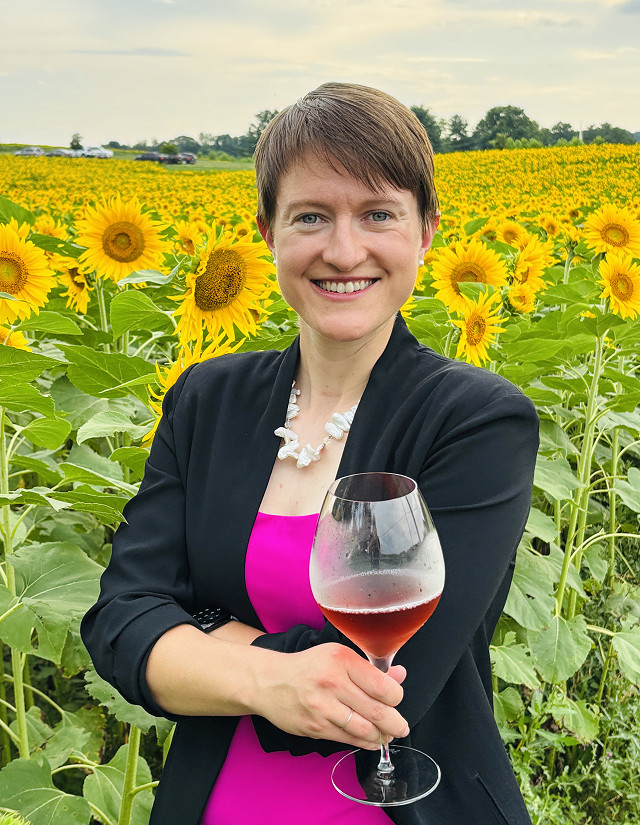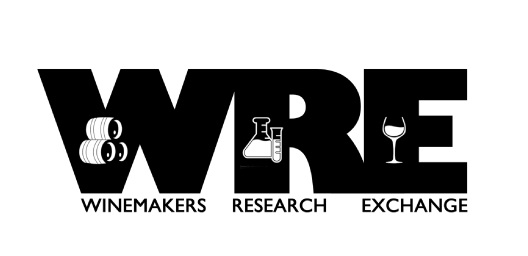1. How do you prefer to be addressed: Dr. Perry, Demetra, Demi… ? What are your preferred pronouns?
I am open to being addressed however people feel most comfortable; generally speaking, you can address me as Demi (she/her). Thanks for asking!
2. What is your official job title at Virginia Tech?
My official job title is Assistant Professor of Enology and Extension Specialist.
3. This position was redefined after Dr. Chang moved away. Tell us a little bit about the job itself (where you will be located, how much is research, extension?)
I am located at the Alson H. Smith Jr. AREC in Winchester, VA. My department “home” is Food Science and Technology (FST), so if you’re ever looking for my faculty page, visit the Virginia Tech FST website. My position is 50% research, 50% extension.
4. What drew you to the field of enology?
My undergraduate education was in chemistry, so I am a chemist by training. I knew early in my career that I wanted to pursue an application of chemistry. At the same time, I was becoming interested in wine as a hobby being in the Finger Lakes (NY). Eventually I realized that there is a lot we don’t know about wine that can potentially be explained through chemistry, and thus began my journey into enology.
5. (Because I always love the nerdy specificity of PhD titles) What was the title of your PhD dissertation, and in a few sentences, what was it about? What were your major findings?
My dissertation was titled Pre-Fermentation Processes for the Removal of Methyl Anthranilate from Concord Juice. I explored two main pre-fermentation approaches (i.e., processing of Concord grape juice) that (we hypothesized) would reduce the concentration of methyl anthranilate in the juice. What is methyl anthranilate, one may ask? You know that distinct flavor that native grapes (e.g., Niagara, Concord) have, or the taste of Welch’s grape juice? That is methyl anthranilate, and my Master’s research at Penn State showed that most wine professionals don’t care for that flavor. These approaches reduced the concentration of methyl anthranilate to sub-threshold (imperceptible) levels in the juice, so that the undesirable grape-derived odorants were removed, leaving a blank canvas for the yeast to generate beautiful and desirable fermentation-derived flavors. When the experimental, treated wine was blended with traditional Vitis vinifera wine, trained panelists were essentially unable to discern between the pure vinifera wine and the blend.
6. You have experience in both academic research and the wine industry. Could you share some highlights from your time in each setting? How have these experiences shaped your approach to working with winemakers?
Yes, I have experience in both academia and industry when it comes to enology; while some may view each as a separate entity, I have always seemed to have one foot in each door, so to speak. While pursuing my Master’s from Penn State, I had an independent study that essentially gave me academic credit for acting as a winemaker and crafting my own rosé wine for a local winery. While working full-time at Heart & Hands Winery, I continued to attend relevant academic conferences. My PhD work involved industry collaborations with producers in both the juice and wine industries, so I have been fortunate enough to be involved in both academia and industry throughout my career. These experiences have taught me that communication is key…and that winemakers are incredibly busy and trying to get more than five in the same room together at any one time is rather challenging.
7. What research topics are you most excited to pursue in your new role?
I think that non-Saccharomyces, or nontraditional, yeast strains have a lot of potential in the Virginia wine industry. These yeast strains are beginning to gain popularity due to their potential to address acidity challenges, volatile acidity problems, as well as rising alcohol levels in response to riper grapes from warmer growing seasons. I think this avenue will be an exciting route to explore.
I’m also excited to hear about the challenges that Virginia winemakers are currently facing, as well as preliminary work from the WRE, that could be continued and/or expanded upon in my research lab.
8. What does successful engagement with the wine industry look like to you? (What can we expect from you in the extension role?)
I think I will know success when I see it, and yes, that assumes that my extension program will be successful! Being so new to the role and to the Virginia wine industry, I want to emphasize that my first “stage” of creating my extension program will be listening to the needs of the industry. I know y’all have a lot to say, so please, let me hear your thoughts! What does success look like to you? What do you want out of an extension program? What kind of activities or workshops have you found useful in the past, or have you found yourself missing? You can expect that I will listen and ask questions. You can expect that I will follow up with you, that your message isn’t being sent into a void. You can expect active participation from me, but I expect active participation, in return!
9. What are you most looking forward to about working in Virginia?
I am looking forward to working in a new climate with a different set of challenges. The Finger Lakes is very much a cool-climate growing region and having spent almost a month in Virginia I can say with certainty that Virginia is not a cool-climate growing region (at least, generally speaking). With a new climate comes an entirely new set of varietals, flavors, and winemaking potential, so I am excited to get to know a new industry (and taste an entirely new set of wines)!
10. How can winemakers and grape growers best connect with you or get involved with your work?
I am very reachable by email (dmperry@vt.edu). Reach out and we can get a conversation going! I will also have a presence on social media, but I’m still figuring out exactly what that will look like.
Text is also fine for a short, brief, quick question (read: please don’t text me a novel). My number is 540-232-6046.
11. For those of us who haven’t met you yet, what’s one fun or surprising thing you’d like us to know about you?
Somehow this is the hardest question…I have a dog named Pretzel and I love dogs nearly as much as I love wine. So, any winemakers that read this and have a winery dog, don’t be surprised if one of my first questions to you is “Do you mind if I say hello to your dog?” Also don’t be surprised if I remember your dog’s name before I remember yours (though I promise, I will eventually remember both!).



